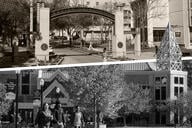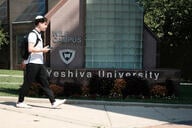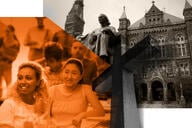You have /5 articles left.
Sign up for a free account or log in.
In offering a seminar for faculty about Roman Catholic higher education, Patrick W. Carey had a clear purpose in mind.
“It was simply to introduce faculty members, many of whom are not Catholic, have no clue or had no clue when they came in about purposes of Catholic higher education – and I must say, those who were Catholic on the faculty didn’t have much of a clue either. Most of them had been educated in secular institutions and were very competent in their fields. But the overall aim of a Catholic education – they had no background in,” says Carey, a professor of theology at Marquette University, a Jesuit institution in Milwaukee.
To remedy that, Carey’s pupils in the semester-long seminar – 10 young faculty members, largely pre-tenure, a mix of Catholics and others -- read and discuss James L. Heft’s “Academic Freedom: American and Catholic" and a report from the "Special Committee on the Christian Character of Marquette University" from 1969. They consider a collection on Ignatian pedagogy (St. Ignatius of Loyola being the founder of the Jesuit order), and Pope John Paul II’s Ex Corde Ecclesiae (On Catholic Universities) and Fides et Ratio (Faith and Reason), among other texts.
In the end, participants craft an action plan detailing their contribution to Marquette's Catholic mission – including areas like social justice and student-centeredness.
Regardless of the faculty member's faith, “we can explain at the very beginning of the class that there are many ways in which people can tie in to a Catholic identity, because there’s a basic human element that all human beings are concerned with, in terms of developing students’ human potential. We can all agree to certain things, in other words,” says Carey, a layperson.
“Some of them really wonder when they come in if this is going to be propaganda but by the time they get through they realize this is an academic enterprise, and they’re free to disagree if they don’t see eye to eye with the texts we’re reading.”
Carey co-teaches the seminar with David Buckholdt, a professor of sociology and director of Marquette’s Center for Teaching and Learning. Buckholdt has a special interest in Ignatian pedagogy, and characterizes his role in the seminar as that of a resident Protestant.
“I’m not Catholic, I’m Presbyterian, and a good number of our faculty who are not Catholic need to understand that they can make major contributions to the mission of Marquette even if they are not Catholic. So I tend to play the role of, ‘What can be contributed if you’re not a Catholic?’” Buckholdt says.
“The tone of the seminar was ecumenical, which I like a lot -- because that's exactly the kind of dialogue I think we need to be having to be constructive,” says Dinorah Cortés-Vélez, an assistant professor at Marquette who researches colonial Latin American literature. She is beginning her third year at the university; she took the seminar last spring.
The seminar, offered each spring and now in its sixth year, is supported by a donor. Marquette is in the process of establishing an endowment to make the seminar a permanent feature of the institution, Carey says. Faculty are invited to participate – the course is not mandatory – and, as compensation for joining the seminar, either get a one-course reduction of their class load, or a $4,000 stipend for their research budgets.
Richard A. Yanikoski, president of the Association of Catholic Colleges and Universities, says that many Catholic colleges have experimented with similar models. Some Catholic colleges run study tours or workshops on Catholic character for faculty and staff; others arrange for lectures or the sharing of papers. Nationally, a summer colloquy known as Collegium attracts faculty and graduate students from various institutions to, per the program description, "explore some of the most compelling aspects of the Catholic intellectual tradition and to develop their own sense of vocation as intellectuals in a contemporary context."
“We’ve known for 20 years, at least, that particularly in regard to faculty, and more recently with regard to administrators, that the number of individuals and the proportion of individuals who are serving in faculty roles and administrative roles at Catholic universities who are themselves Catholic – and as a subset of those who are Catholic, those who are well-informed Catholics – is smaller than it used to be. For the simple reason that, prior to the last 20 years or so, the majority of those positions were held by men and women of the cloth,” says Yanikoski.
Speaking of the various faculty development models (though not Marquette's specifically), he continues: “We do know that people come out of these sessions, by and large, feeling affirmed. They have been challenged, they feel closer to their colleagues. The piece that we don’t have is, all right… they felt good when they did it, but how does it actually impact their teaching over the next five years? Does it have an impact on whether they stay in Catholic higher education or take a position elsewhere somewhere down the road? Does it influence the questions they pursue in their own research or profession?”
Carey describes Marquette's Faculty Seminar in Catholic Higher Education as “only one phase of the process of maintaining the identity. There are other ways people do it, even at Marquette."
“We don’t know what effect this will have ultimately on the overall identity of the institution.”




